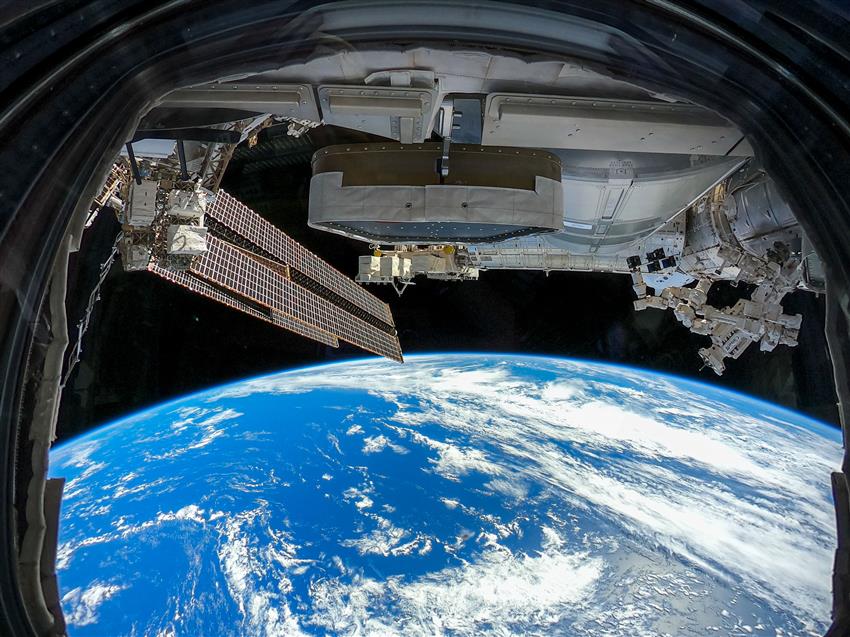Canadian scientists to lead new ground-based studies to benefit astronauts, life on Earth

A view of the Pacific Ocean as seen from a window of the cupola on the International Space Station. (Credit: NASA)
The Canadian Space Agency is supporting Canadian research designed to ultimately better understand the effects of space on the human body. Nine grants will support scientific investigations using ground-based research approaches. The projects will be conducted by researchers at Canadian universities.
The first approach, data mining, involves analyzing previously collected data to gain new knowledge. While astronauts live and work onboard the International Space Station, a lot of information on their health is collected. The aim of these studies, performed afterwards on Earth, is to analyze existing data in the hopes of shedding light on new research questions.
Three grants using data mining are awarded to:
| Researcher and institution | Study topic | Grant amount (Canadian dollars) |
|---|---|---|
| Dr. Richard Hughson, University of Waterloo |
The team will study how well blood vessels in the brain soften pulses from the heart. They will also test whether astronauts' exercise routines protect their brains. A better understanding of the link between blood vessel health and thought processes in aging humans on Earth can help protect astronauts during future long-duration missions venturing farther into space. | $70,000 |
| Dr. Steven Boyd , University of Calgary |
Using data gathered for Canadian ISS study TBone, the team will study bone loss in space and subsequent regaining of bone structures after astronauts return to Earth. Although some bone mass is recovered after returning to Earth, the bone structure may permanently change. | $70,000 |
| Dr. Simon Duchesne, Université Laval |
Changes to sensation, movement, coordination, and reasoning during space missions can affect an astronaut's performance. The team will analyze images of astronauts' brains to track how brain health is affected by spaceflight, using methods similar to those used to track aging in terrestrial populations. Results of this study could aid patients affected by brain degeneration such as Alzheimer's disease. | $70,000 |
Using research models, scientists can test their ideas on model organisms such as yeast, rodents, and tissue samples exposed to various aspects of the space environment, here on Earth. This type of research can help prepare for missions to deep-space destinations and could improve the quality of life on Earth.
Six grants using research models are awarded to:
| Researcher and institution | Study topic | Grant amount (Canadian dollars) |
|---|---|---|
| Dr. David Alexander MacLean, Northern Ontario School of Medicine |
The team will use a model that simulates spaceflight to understand the combined effects of radiation and microgravity on tissues like muscles, bones, eyes and the brain. They will also test whether dietary supplements can be used to counteract the effects of damage to healthy tissues. | $150,000 |
| Dr. Rachel Holden, Queen's University |
This team will investigate the role of dietary phosphate in bone loss in rodents and whether males and females are affected differently. This study could help shed light on optimizing astronauts' diets and have implications for people on Earth at risk of bone loss. | $149,975 |
| Dr. Bernard Jasmin, University of Ottawa |
As muscles weaken, they get tired more quickly and are more fragile. The team will focus on understanding how muscles lose their size and strength in space, specifically looking at the role of protein Staufen1, and test therapeutic inventions that could be used to counteract muscle atrophy. | $150,000 |
| Dr. Val Fajardo, Brock University |
The team will determine if inhibiting the activity of an enzyme (glycogen synthase kinase 3) will slow the decline of muscles, bone strength and cognitive awareness. | $150,000 |
| Dr. Matthew D. Regan, Université de Montréal |
The team will examine whether resistance to muscle deterioration observed in hibernating mammals could inform how humans conserve and build muscle protein during spaceflight. | $149,040 |
| Dr. Bettina M. Willie, McGill University |
This team aims to use mouse models to understand the relationship between night-day cycles, muscle use and bone loss. | $150,000 |
Reducing health risks is critical for long-duration space missions. These studies hope to improve the understanding of the effects of space on the human body and the development of mitigation techniques that can help support the well-being of people in space and on Earth.